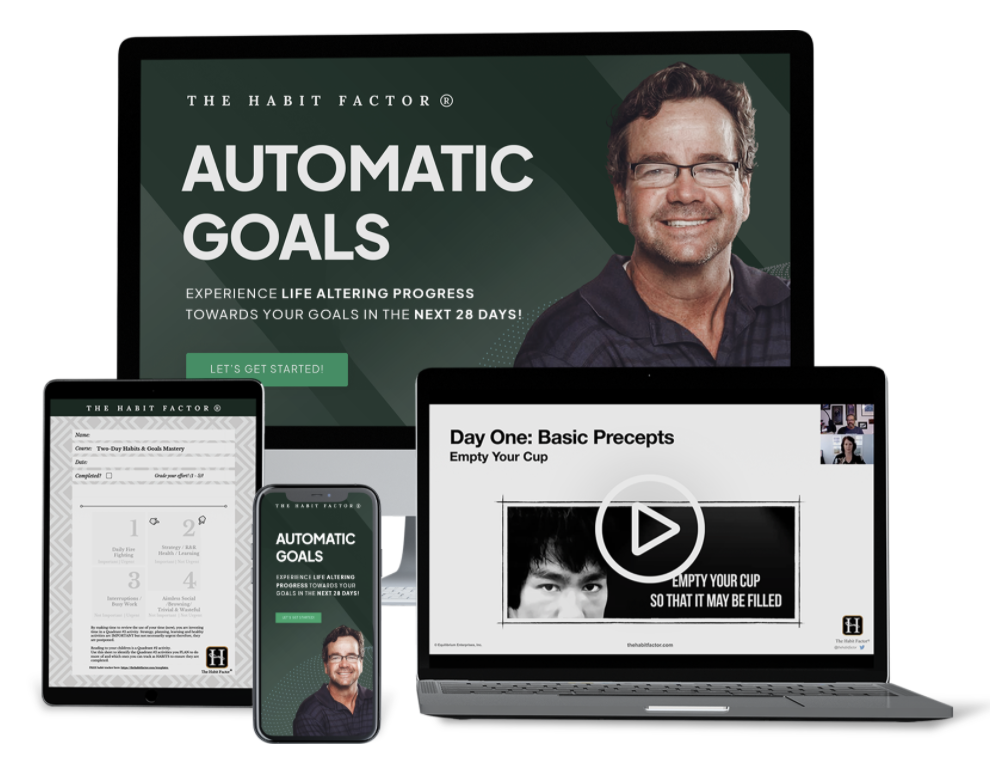“When it comes to habit development, humans can, and should, leverage their innate capacities of choice, intention and reflection.”
Today’s Mind-Bullet is about why habit tracking is beneficial. AGAIN.
After being interviewed for a habit-specific podcast recently, the host was left a bit befuddled as MG challenged much of what the host was told were “best practices” around habit development.
At one point, the host mentioned that a habit expert and behavioral scientist had insisted that habit tracking was not a requirement or even a recommended practice, and that habit-tracking apps didn’t work.
The truth is, people do not need to track habits in order to develop them. Unfortunately, people forge habits all the time unintentionally, and regrettably, they are habits that do not serve their goals.
It’s worth considering that if habit-tracking apps didn’t work so well, why would there be so many of them? And, nearly all of them have entered the app marketplace after The Habit Factor was introduced more than a decade ago.
Further, some of the most-cited habit studies—for instance, the European Journal of Social Psychology, which concluded that on average, habit development takes 66 days—utilized habit tracking with their participants.
Another terrific example of habit tracking can be traced all the way back to our great founding father, Benjamin Franklin.
Ben intuitively recognized that in order to cultivate the 13 virtues he desired to possess as an older man, he needed to track them. Benjamin Franklin then devised a strategy to track one habit (virtue) a week for 13 weeks, and rotate through his list of 13, four times a year.
So, you may be wondering, “How did that work out for Ben?”
Well, as he remarked in his autobiography, it (habit tracking) may have added the greatest value to his life, and that, “he was a better person for the effort.” Further, he encouraged his readers to follow his habit-tracking example, saying, “I hope therefore that my descendants will follow the example and reap the benefit.”
That’s right! Benjamin Franklin wants you to track your habits!
If you’re thinking, “Ben didn’t track habits, he tracked virtues,” you need only understand that habit is the means—a pathway—to virtue, according to Aristotle, that is.
So, when it comes to intentional habit development, put your unique human capacities of choice, intention and reflection to work and follow the P.A.R.R. method of habit development.
Be like Ben! Enjoy the episode!
How are you going to improve your results in 2021?
Visit: https://thehabitfactor.com/challenge
TEXT your toughest #habits and #goals questions and be eligible for giveaways each week! 619-547-1915
***
New listeners: By texting the word “HABITS” to the mobile phone number “33444″ you will instantly receive your “hack”/habit tracker/habit development template, or you can download it here: thehabitfactor.com/templates.
Feel free to share the episode and leave a review on iTunes!
Recommended in this episode–>>
Grab your FREE copy of As a Man Thinketh (PDF) right here:
As a Man Thinketh
*****
*****
TOOLS/BOOKS WE RECOMMEND:
Bucket List PRO (iOS app) iTunes
Grab your FREE copy of As a Man Thinketh (PDF) right here:
As a Man Thinketh
The 3 C’s of SucCcess (Mitch W. Steel)
The Psychology of Achievement (Brian Tracy)
The Power of Positive Thinking (Norman Vincent Peale)
The Magic of Thinking BIG! (David Schwartz)
Think & Grow Rich (Napoleon Hill)
The Success Principles (Jack Canfield)
Getting Things Done! (Allen’s Great Book!)
**HABIT FACTOR RESOURCES!!**
(FREE! The Habit Factor’s Tracking Template)
The Habit Factor® (website: BLOG, tips, tools and other resources)
The Habit Factor® Book (Amazon Kindle)
The Pressure Paradox® Book (Amazon Kindle)
The Habit Factor app (iOS, Android)
**WEBINARS**
Free Webinar: (Mini Course) Why Happiness is a Habit and how to cultivate it!
Free Webinar: (Mini Course) Focus & Discipline
———
Thank YOU for checking out this episode and we’re always grateful when you SHARE our episodes w/ your friends and family and help us by writing a review ; )
———-
